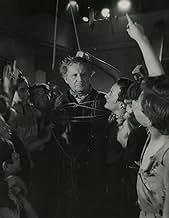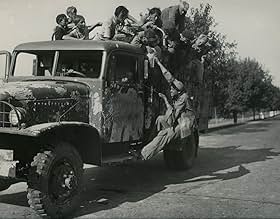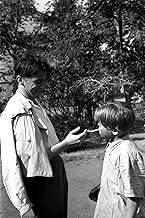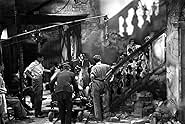Valahol Európában
- 1947
- 1h 40min
Una banda de fugitivos y huérfanos de la guerra recorre el campo en busca de comida y refugio. Los invaden y luego los acoge un músico y antiguo concertista de piano que se esconde en un cas... Leer todoUna banda de fugitivos y huérfanos de la guerra recorre el campo en busca de comida y refugio. Los invaden y luego los acoge un músico y antiguo concertista de piano que se esconde en un castillo en ruinas.Una banda de fugitivos y huérfanos de la guerra recorre el campo en busca de comida y refugio. Los invaden y luego los acoge un músico y antiguo concertista de piano que se esconde en un castillo en ruinas.
- Dirección
- Guionistas
- Elenco
Opiniones destacadas
The old wise man is teaching the kids humanism and French revolution, even though this movie was done after the Russians invaded Hungary (I'm sorry, "freed" us), and stayed here for almost 50 years. So you can imagine how much freedom we had here! The Russian army raped over 100 thousand women in the country in '44. They killed a lot of civilians too.
Besides, the movie is full of editing mistakes. There is barely any story here, just not obnoxious kids and grownups. Shitty music score as well. I can't understand how can they consider this as one of the best Hungarian movies?
Do not watch it if you don't want to be brainwashed.
There is no established storyline in this piece of awfulness. The kids run away from an orphanage. For some reason the orphanage contains a theme park with a panopticum of Nazi leaders, in which Hitler is melting during a bombing raid. After a set of forced symbolics, our heroes are on the road - leading nowhere. They meet an old musician who teaches them about how great the French Revolution was, and we also see a former Nazi putting away his uniform and taking up a new role in a new society. And so, what else? The entire story leads nowhere, it's shallow and illogical.
Technically the movie is also a disaster. There are basic editing mistakes, eg. there is a scene which was inserted reversed (see the boat under the bridge actually going backwards), the camera sometimes goes out of focus, equipment gets visible, animals stare at the crew (ie. a dog in the foreground). It's a school example of how the Communists recruited all-thumbs amateurs to replace the great experts of Hungarian movie industry who all fled abroad or died during the war. In its time this movie was heralded as the "greatest movie of all times", its makers were celebrated countrywide, and this lie is kept alive even today, with all the hype around this crap. It's OK to watch if you wish to see something North Korea would produce these days, in a contemporary fashion. But as a movie - forget about it.
¿Sabías que…?
- TriviaVoted as one of the "12 Best Hungarian Films" ("New Budapest 12") by Hungarian filmmakers and critics in 2000.
- Citas
Kuksi: What are you writing?
Piotr Simon, the old man: Sheet.
Kuksi: What's the use of that?
Piotr Simon, the old man: That makes music.
Kuksi: And what's the use of that?
Piotr Simon, the old man: Huh, you can ask me some very hard questions. How do I say? If something hurts you that very much, or something is so beautiful that it cannot be told by words, then it is told by this way.
[begins to play the piano]
Piotr Simon, the old man: It is heard more easily, you understand?
Kuksi: No.
Piotr Simon, the old man: Listen to me. There was once a young man in a far-far away land somewhere in France, who would have a lots of things to say to the people. He sat down to the piano and did this.
[he begans to plan 'Le Marsellaise']
Piotr Simon, the old man: Didn't you hear this before?
Kuksi: No.
Piotr Simon, the old man: Neither of you heard it?
[no answer just sharp looks]
Piotr Simon, the old man: It doesn't matter. Nobody has heard it back then. But one day someone walked by in front of the young man's window and heard it. Then another one, then another one. One of them whistled it, another one sang it. More and more people began to sing it. The song has been given wings. And when a giant crowd sang it, they answered with cannon fire. And with bigger and bigger cannon fire, with tanks and machine guns. But the song always remained stronger. It was spread all around the world. Because everywhere the people understood what that young man wanted to say.
Ficsur: And what did your young men wanted to say?
Piotr Simon, the old man: He wanted to say: freedom. This is not a child's play, this is the favourite game of the grown-ups. If they try to take it away from them, there's always a great trouble in the world. That's what only so few people understands. That's my favourite game also.
Péter: Nice little game. We have played it enough on the country roads. Freedom. We have nearly died of starvation!
Piotr Simon, the old man: You weren't free! You had to tramp, to steal, to rob or else you would die in hunger. Freedom is when you are not forced to suffer, to do bad things and to hurt others. The greatest captivity is poverty.
- ConexionesFeatured in Fejezetek a film történetéböl: A magyar film 1945-1957 (1990)
- Bandas sonorasLa Marseillaise
(uncredited)
Music by Claude Joseph Rouget de Lisle (1792)
Played on the piano and taught to the children
Selecciones populares
Detalles
- Fecha de lanzamiento
- País de origen
- Idioma
- También se conoce como
- It Happened in Europe
- Productora
- Ver más créditos de la compañía en IMDbPro
- Tiempo de ejecución1 hora 40 minutos
- Color
- Relación de aspecto
- 1.37 : 1
Contribuir a esta página






















